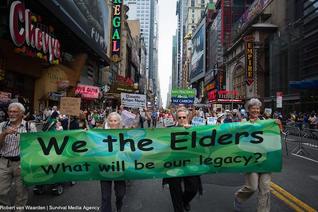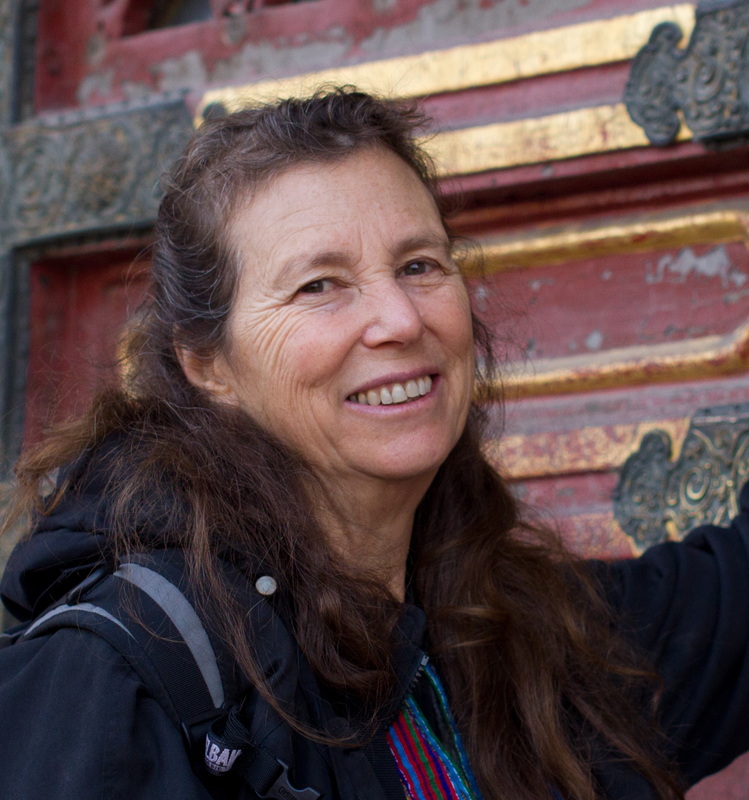
Lynne Iser has plans to get arrested next month, and she wants hundreds of other elders by her side when she does.
“I grew up in the 60s. Back then we had a great deal of pride in America. Of course there were plenty of big problems — Civil rights, the Vietnam War — but it still felt like we had a democracy.” A Philadelphia area activist, Lynne is helping to coordinate a group called Elders Standing for Democracy Spring. “It doesn’t feel like that anymore,” she told me over the phone.
Lynne is hardly alone. Academics recently found empirical evidence that governance in the U.S. more closely resembles an oligarchy than a democracy, and majorities of Republicans, Democrats and Independents report in poll after poll that they want our leaders to overhaul the way we fund campaigns, and they want it now. In the middle of the most cash-drenched election cycle in American history, Congress has responded to that incredible consensus of public opinion with ... nothing.
That’s why Lynne, and thousands of others, are planning to join Democracy Spring, a 10-day march and series of mass sit-ins at the US capitol this April, demanding action on the twin crises plaguing American democracy: the flood of Big Money drowning out the voices of most of us in our government, and the surge in attacks on voting rights in States across the country.
Seniors and retirees have always been politically active in the US: after all they have some of the highest voting rates in the country, and the AARP is a lobbying force to be reckoned with. But I wanted to learn more about this group of activists recruiting friends and others in their generation to spend some time in a Washington jail next month. A Club Med crowd this ain’t.
Maynard Weinberg, a retired professor of sociology in Philadelphia, is no stranger to protest. He and his wife Sheila took their grandkids to the People’s Climate March in New York a year and a half ago, and to a #BlackLivesMatter march last year. Maynard thinks it’s not a coincidence that elders are a key constituency in this fight.
“We’re at an age now where we do have more time. But there’s something else too: when I went to demonstrations in the ‘60s I noticed a lot of people in their 60s, 70s and 80s at the marches. I think it’s because those were the people who came of age in the Great Depression, and they knew about the power of movements. I think we’re in another moment like that now, where people my age who lived through the ‘60s and saw that same power are getting active again.”
This resonated with another woman I spoke with, a retired educator who lives in New England (she asked that I not use her name in this article), who described a lull in her activism during the busiest years of her professional life, after marching for civil rights and against the Vietnam War in the ‘60s and ‘70s. Now that she plans on attending the sit-ins at Congress next month, I asked her how she would explain to her grandchildren why she could end up in jail.
“I would tell them I’m doing this because I care enough about the kind of country we’re leaving for them. I want them to have a chance to have a full say in it.”
It’s a feeling that seems to have resonated with my parents too. My mom is planning to join the sit-ins, and my dad, a retired attorney, plans to volunteer with the legal team providing support for the actions. When I first described Democracy Spring to my mom, she said, “It’s about time. Just tell me where to sign up.”
“Democracy is the bedrock of our society. It’s what we send people off to war for. It’s not a controversial issue!” Lynne Iser, the Philadelphia activist, told me. Lynne has set a goal of getting 200 elders to sit-in and risk arrest together during Democracy Spring, and she’s networking and organizing across listservs and Facebook to recruit. This also isn’t her first rodeo; she’s been involved in climate activism for many years and helped organize a flash mb in Washington last fall for Grandparents Climate Action Day.
“I think elders in particular have an urging to risk more now than when we were younger. This inner urging is that piece about wanting to leave a legacy. I’m concerned about what happened on my watch.”
These conversations made me think about another elder activist I met years ago as a student journalist. One of my first stories ever in print was about 90-year-old Doris Haddock, better known as Granny D, who walked over 3,200 miles from Los Angeles to Washington, D.C., to call attention to the corrupting role of money in our political process. I met up with her in the Spring of 2000, while she was circling the capitol at a surprisingly nimble pace. We chatted about campaign finance reform legislation while she nibbled on a Twix candy bar I brought her (I’d been told she had a sweet tooth).
A month later Granny D and over two dozen others were arrested for reading the Declaration of Independence inside the capitol. Before being led away in handcuffs she told the crowd “Our right to alter our government must be used to sweep these halls clean of greedy interests.’’ Granny D later said to the judge, ”Your Honor, some of us do not have much power, except to put our bodies in the way of an injustice — to picket, to walk, or to just stand in the way.”
Doris Haddock died in the Spring of 2010 shortly after the Supreme Court’s Citizens United ruling threw open the floodgates of corporate spending in US elections. The current state of America’s dysfunctional campaign finance Wild West would have no doubt caused her anguish had she lived to see it.
But I think Granny D would also be thrilled to know that hundreds of American elders, seniors and retirees, along with thousands of others, are now planning to take part in one of the largest acts of mass civil disobedience in recent American history, to demand Congress take action to stop the destruction of our democracy. The spark she lit is still burning bright, and the light is about to shine even brighter this Spring.
WHAT CAN YOU DO?
Learn more about Democracy Spring
JOIN US in Washington. Sign up on the Democracy Spring website.
Learn about other organizations promoting democracy -- Small Planet Institute; Democracy Matters; Move to Amend; 99Rise

 RSS Feed
RSS Feed


